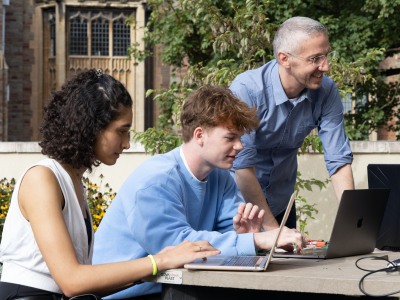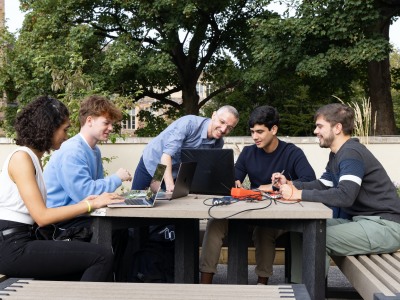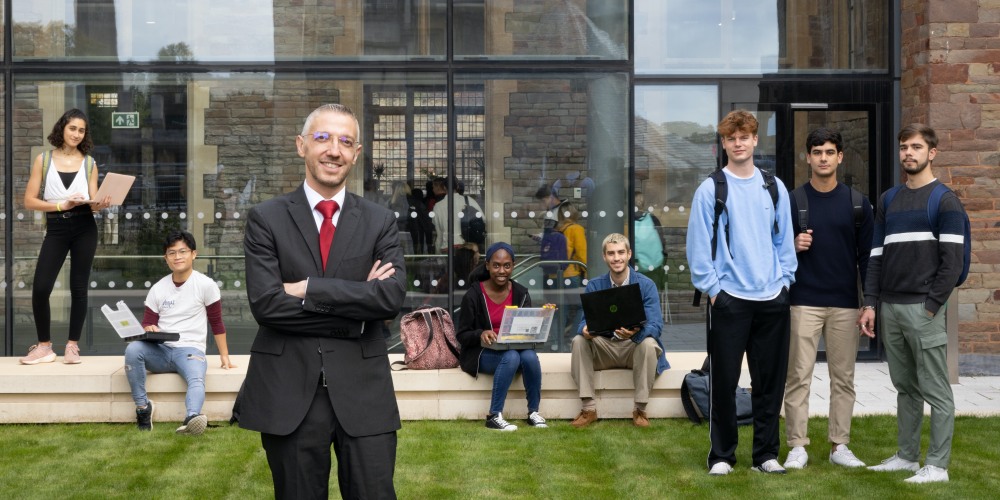Meet the Electronic Engineering lecturer with pioneering teaching methods
We caught up with Professor Francesco Fornetti, recently nominated for Most Innovative Teacher of the Year in the Times Higher Education Awards 2022, to ask what it was like to receive the nomination.
How did it feel to be shortlisted for Most Innovative Teacher of the Year Award?
I was truly delighted! The Times Higher Education Awards are one of the main reference points for good teaching practice, internationally. More importantly, I felt it would give me the opportunity to share my practice with other academics looking to embark upon similar endeavours, helping shape the learning experience for engineering students across the globe.
Can you talk us through your subject area?
My area of expertise is Radio Frequency (RF) Engineering: in layman’s terms, designing circuits to transmit and receive radio waves. My research focus was on high-power and high-frequency amplifiers using a novel semiconductor material (at least it was novel when I started my research!) called Gallium Nitride.
Back then there was some skepticism about this new compound but it’s now pretty ubiquitous in wireless communication systems! Interestingly, my PhD thesis has itself become more useful as a teaching tool than as research work. To my knowledge, it’s been downloaded more than 20,000 times!
Where did your love of electrical engineering first start?

My uncle Angelo owned an electrical appliances shop in a little country town in Italy and as a child, I used to love spending time there and seeing all of the technological marvels that would come out every year.
Growing up in the 80s, I witnessed several life-changing innovations. I wanted to be part of that change; to learn how to make those wonderful things. In a bit of serendipity, my uncle struggled to keep up with the galloping pace of technology. He was overwhelmed by the transition from knobs and screwdrivers to a more digital world, which allowed me to take a front-line role in deploying new technology.
He would collect me in his Fiat Panda and drive me to customers’ houses to install TVs, VCRs, and Set-top boxes, which were scarily complex back then compared to today’s plug-and-play devices. He loved just having a coffee, a smoke and a gossip while I did the work. I loved getting the odd 1000-5000 lira tip (30p – £1.50) which could buy a lot of Italian gelato back then!
This experience taught me a lot about communicating with people from very different backgrounds. Simplifying complex concepts down to something digestible. Looking back, those were my first teaching challenges. I realised that those with limited education – some like my mother, had just five years of schooling – had just as much potential as anyone to find their feet and learn to use new technology, if the right communication avenues were found.
What made you transition from real-life practitioner to teaching-focused academic?

I always thought that the last few years of my career would be spent in academia. I think the transfer of knowledge to a younger generation of engineers is critical to preserving technical know-how accrued over years in industry. However, an accident in 2014 made me only too aware of how the gift of life can be taken away at very short notice. This really made me reflect on what I wanted to do with the rest of my time on this earth.
I fondly remember the instant visibility and gratification involved in teaching from the days I spent as a teaching assistant during my PhD. Students would tell me that I’d helped them turn a corner, gain confidence, and develop a passion for electronics and technology. I felt perhaps that was my true call, my true vocation. Not one that would make me rich, but one that would make me feel like I was worth a million dollars all the same.
Most days I look in the mirror and think, I’m proud of what I’ve done today. Admittedly, these positive thoughts are swiftly followed by a quick deposit in the facelift piggybank!
Technology has meant that teaching styles have seen a dramatic shift over the decades. Why do you think it is important that teaching-methods also move with the times?
Teaching is underpinned by effective two-way communication and this will always remain the case. However, the channels used to communicate will continue to evolve, as too will the language used on them.
Find out more
Dr Francesco Fornetti – profile
Explore RF – YouTube guides
Tik-Tok channel
Electrical and Electronic Engineering courses
School of Electrical, Electronic and Mechanical Engineering
THE (Times Higher Education) interview
One should not be bogged down by what they think should work and what they think that students should buy into. They should instead understand what makes them tick and resonate with them.
We can’t shy away from modern social media platforms in academia. In fact, I have used these very successfully in my practice. Starting with YouTube for video tutorials, Facebook as a means of creating a peer-support platform for home lab kits, and even Tik-Tok, to make labs more engaging and help students work more independently through their lab exercises. This was especially important when Covid severely restricted close interaction between staff and students.
Who in life is your biggest source of inspiration?
The most amazing skill any teacher can possess is effective communication; the ability to know your audience and to pitch your message at the right level. A master of this is David Attenborough. His documentaries push you far enough to learn new things but never in a way that makes you feel that you are not good enough to follow. I truly admire him.
It is tricky to get this right at university, particularly with such variety in our students’ intake, but I always strive to deliver my material and set up my modules in such a way as to enable people to learn at their own pace and always find handholds than they can easily grip to avoid falling in a pit of despair filled with feelings of inadequacy and helplessness.
You are the mastermind behind some of the University’s best student resources, some of which were developed during the pandemic. Can you talk us through some of these initiatives?
I’d say my most impactful teaching innovations include:
- Virtual laboratories, which harnessed the power of industry-standard simulation software (AWR DE), traditionally employed as a design tool, to enable students to gain a much deeper and more conceptual understanding of circuit design and operation. These created truly ubiquitous experimentation facilities that fostered independent and enquiry-based learning. They were supported by a large number of bespoke video tutorials freely available on YouTube which were pivotal to their success. Importantly, this work made it possible to timely replace many physical laboratories with simulation in 20/21 and has supported many final-year projects.
- Home Lab Kits – featuring USB-powered instrumentation and battery-operated circuits, the kits enabled students to carry out some of their laboratory exercises at home. First introduced as loanable kits in 2016, students could prepare for in-person laboratory work or complete outstanding work from timetabled sessions. The value of this work quickly became apparent during Covid where laboratory time was confined. The original kits paved the way for the latest engineering at home kits which are now widely used across the faculty and issued to students at the start of their degree to use throughout their time at the university and beyond.
- Finally in 2020, I introduced remote test stations, enabling students to log into a lab PC and characterise circuits by controlling equipment remotely through a web interface. These are now used routinely, offering students 24-hour access to experiments. This was only possible thanks to the forward-thinking redesign of the main electrical lab, which I led in 2017.
We can’t let you go without asking… Coffee or tea?
I am stereotypically Italian in that regard so espresso or espresso macchiato all day long. I actually have an espresso machine in my office, and just to appease the health and safety people who may be reading, yes, it has been PAT tested.
View Professor Francesco Fornetti’s entry video
An update since this post…
The teaching accolades continue for Professor Francesco Fornetti, having recently received news of his National Teaching Fellowship (NFT) – the highest possible award for teaching in UK higher education. With only 55 recipients each year, the NFT recognizes exceptional educators who have made an outstanding impact on student outcomes and the teaching profession. Congratulations Prof. Fornetti!


